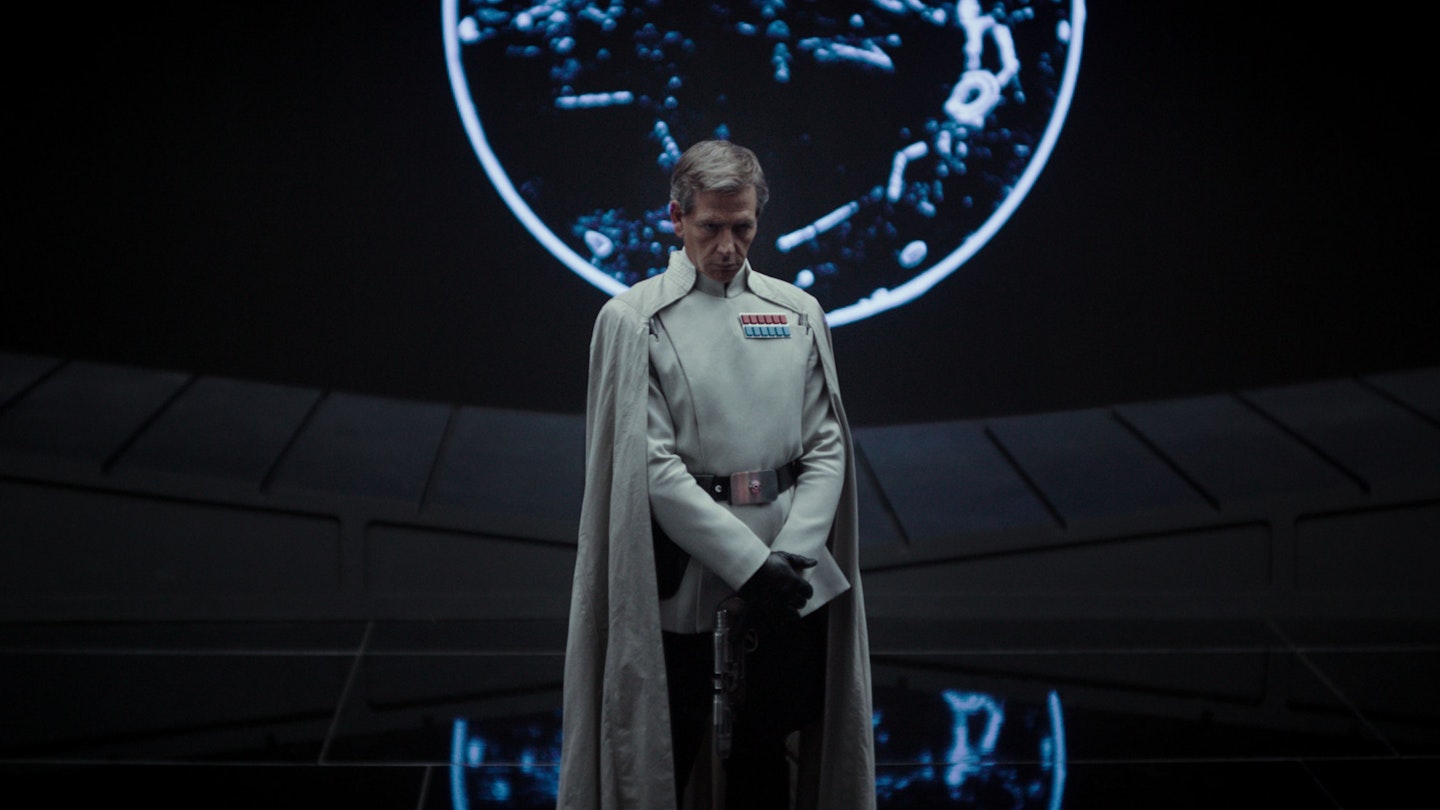Sinister Agents
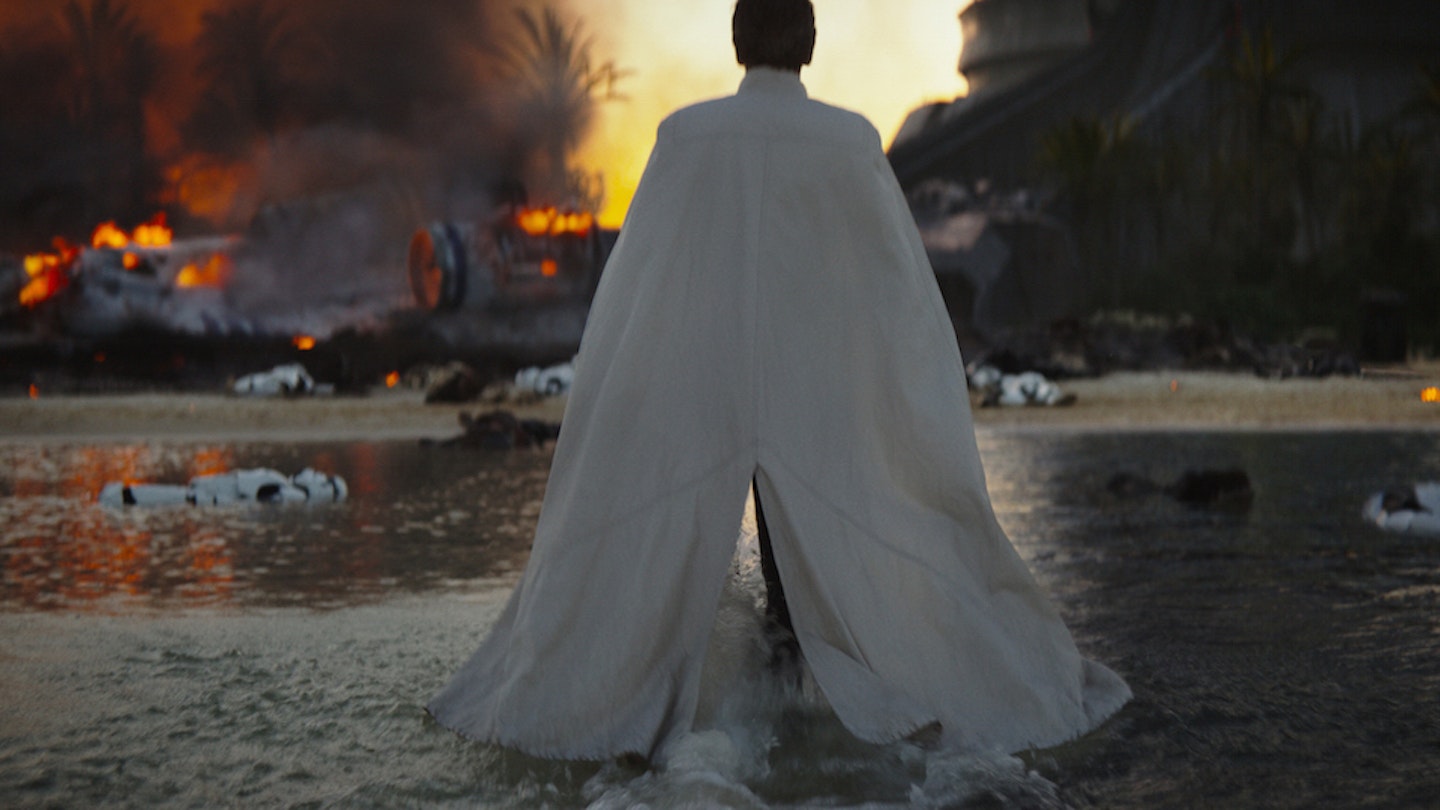
Kennedy: Ben Mendelsohn is just extraordinary in everything he does. [As Director Krennic] he is probably our most evil villain next to Darth Vader. But the amazing thing is that Ben always creates vulnerability and sympathy and understanding. There is a humanity to what he brings to his roles. I think that works really well in this story.
Ben Mendelsohn (Orson Krennic): Krennic heads up military intelligence, basically. That's his job. So he is director of an incredibly important division within the Empire. And he is tasked with building this... thing. And back in the day he and some of his fellow young people of the Empire hatched the idea for this machinery. And as with any project that's large and technically complicated, it's taken them many, many years to realise that dream. And there's important stuff that needs to be overcome in order to bring it to its fruition. But he's the man that built it.
You’ve gotta know what you’re doing when Vader turns up on set.
Edwards: This'll make sense to English people more than anyone else, but the Empire's a little bit like the BBC [laughs], in that it's very Oxbridge, right? I feel like the headhunters for the Empire [roles] probably hung outside the Royal Shakespeare Company. And Ben wanted to embrace the fact he wasn't British and that Krennic probably had more of a working-class kind of route through the Empire, but was very effective at what he did. He wasn't part of the gentleman's club and he didn't go to the Imperial equivalent of Eton. He went to normal school and got beaten up and beat people up, and then found himself moving up the ranks. But there's a limit to where they'll let him go because he's not one of them and it's frustrating to him that that's the case — and he's gonna try and stop that being the case in our film. But it's all stuff we made up that maybe never comes through in the movie…
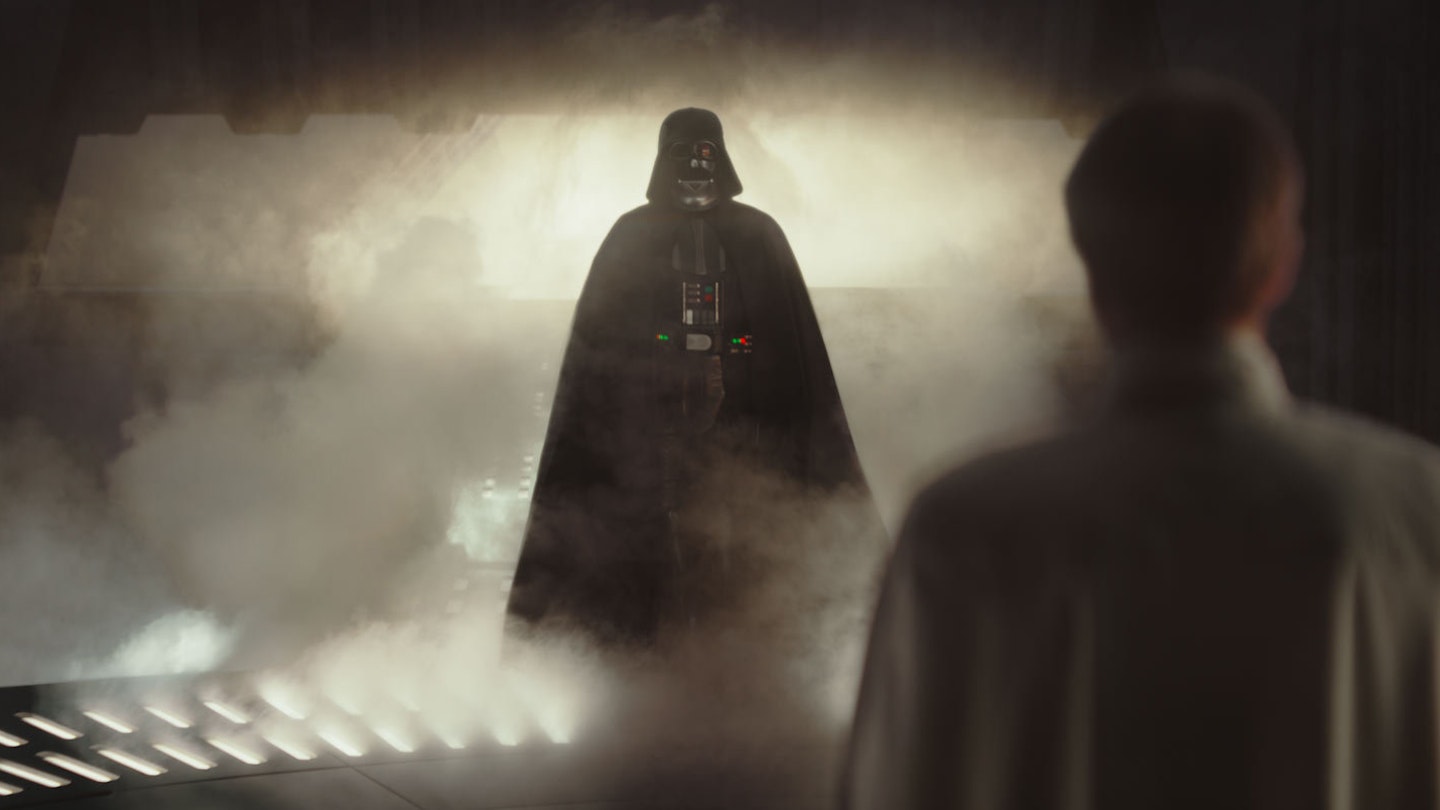
Mendelsohn: You know, there is an element of that. There definitely is. Krennic does not come from the aristocracy of the Empire, if you like. He is truly a man that has made his own way up the chain through his own abilities. So his weapon for instance is a very old type of blaster. Because he's an old warrior dude that has been put in charge of, you know, making this thing happen. And it's gonna get done. Darth Vader is very much about the Force. Krennic’s not. Krennic is a lot more about force.
Kennedy: Obviously, Vader is extremely important if we are going to dovetail into A New Hope. It was exciting to bring James Earl Jones back into the sound booth. There’s nothing like it. You can look at Vader, and you can block a scene, and you can create all the moments you want, but not until he speaks do you get goosebumps.
Mads Mikkelsen (Galen Erso): Sharing scenes with Darth Vader is just as crazy as it is sharing scenes with James Bond. This is iconic stuff, and to be if not in the same scene, at least in the same film as some of these larger-than-life characters, that is something.
Mendelsohn: He’s enormous. And he’s completely singular. There’s no-one like Darth Vader. His presence is awesome. And, you know, he commands a certain amount of respect and deference [laughs].
Edwards: You’ve gotta know what you’re doing when Vader turns up on set. I went back and re-examined the original trilogy and one of the things about Vader that I learned very quickly was no-one is allowed to have their eyeline higher than him in a shot. It’s a weird thing. If Vader is further away than someone else and you’re at head-height, it makes the person closer look bigger, and that’s a big no-no. Vader is always the tallest person in the scene.
A Period Of Civil War
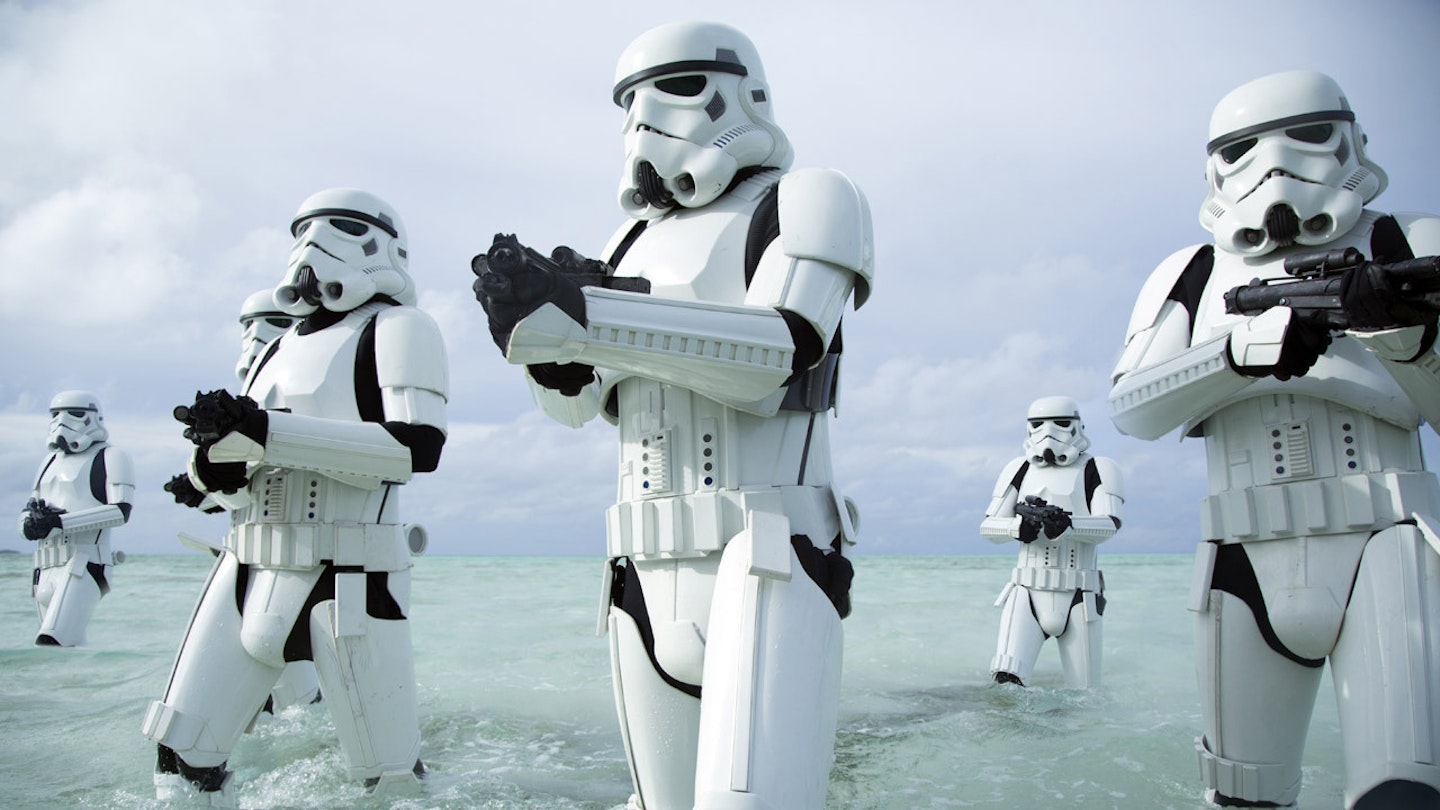
Edwards: There’s a milestone in film when on the first day of filming, when you shoot the first shot, there's no going back. You’ve officially started the film and all these contractual things get going, and then it's like you're finally doing it. And until that moment, anything could happen.
Jones: On our first day, the first shot was literally at dawn in Jordan, in the middle of the desert, in the middle of Wadi Rum.
Edwards: We were up at like literally 2am to get there. We drove out into the middle of nowhere, and we were desperate to do everything we needed to get whilst this light was beautiful. And about six shots in we all looked at each other and went, “we're filming Star Wars”. We'd been so busy that we hadn't noticed it had started.
Jones: I remember looking up at where they were preparing for the next shot, and this Stormtrooper was standing on the top of this ridge. Alan and Diego and I just sort of looked at each other and went, “how incredible is this?” It was extraordinary.
Tudyk: I went to Jordan, to the Maldives, we were in London for six months. I didn’t do the Iceland jaunt but I did everything else. It felt epic. It was definitely the most I’ve ever travelled on a film. It felt like a marathon.
Jones: It was sometimes quite distracting because Alan would wear this extraordinary pajama-suit with ski boots and these kind of half-a-metre long stilts. There were often times when we'd have to stop ourselves from laughing too much 'cos he had this very strange grey suit on that had all these weird triangles on it, which is obviously what helps him become Kaytoo later on in the process. But he's fantastic, he comes very much from a comedy background, so he'd always be throwing in lines that would just make everyone on the set laugh. He really kept the atmosphere very light. There was a lot of corpsing.
Kennedy: This whole group of actors got on unbelievably well. I think they all worked off one another. They certainly loved working with each other.
Yen: You know, you spend enough time [working together], we better love each other! [laughs] No, we had a lot of fun. I've been 33 years in the film business, I've been in so many movies so I'm a serious actor and film-maker and I respect anyone who has the same passion and integrity, and I'm very happy to see that every one of us came in fully prepared and wanting to make the best film. It's been a blast.
It was such an adventure, but I did get absolutely covered in bruises from head to toe.
Jiang: This is the second time Donnie and I worked together. The first time, he couldn’t speak Mandarin. He speaks Cantonese. You know, Cantonese for me is more difficult than English. It's true! [laughs] All the time I could not understand him. But this time his Mandarin's marvellous. Suddenly. I don't know how!
Ahmed: My main approach was to try and learn as many different kinds of swear words in as many different kinds of languages as possible. That's something that means you can communicate with people quickly.
Tudyk: I always feel like there's always one on a movie. You know, like, yeah there's this one guy or lady: “Oh they're kind of a troublemaker”. There wasn't one on this, which made me think it was me for a while… But it turned out no, I was told it wasn't, so I'm good with that. Everybody got along very well.
Jones: It was such an adventure, but I did get absolutely covered in bruises from head to toe. I spent a lot of time nursing my bruises after work [laughs]. My family would be like, “You okay? Is there anything we should do?” “I'm fine, it's just another day on set, don't worry about it”.
Luna: I can tell you, on my Sundays when I didn't have to work, I literally looked like I was coming from... from war, basically you know? It's like we were wounded, [laughs]. Gareth loved the idea of actually making things happen. There was not much to imagine here, our work was pretty easy. Things were exploding in front of us, we were running, the guns we were holding were very heavy, they made noises every time you shoot... It was just insane.
Jiang: Baze’s armour is very heavy, and his gun is also heavy. It’s a huge burden. Can you imagine that? Heavy and wet, in the Maldives. And very hot. Then you have to run on the beach. On the sand [laughs]. Crazy.
Tudyk: There was one moment [in the Maldives] where we were shooting something and Gareth said, “Everyone, RUN! RUN!” [laughs]. And there was sand. And I'm on stilts. It's like, all right, this is the time to give that a shot, I hope this goes well! And I did. I pulled it off. Not every time. It was like I had a flat tyre, like if one footfall went wrong it looked like one leg was broken, but I stayed up.
Ahmed: It’s mucky, grimy. You’re in the trenches. And that makes it different to the other films. Of course, there’s a lot of action and war and peril in those films as well, but I think you’re just dropped into it in a different way.
Edwards: We tried to do things differently for sure. We built 360-degree sets and shot in all directions and no one would know where the camera was gonna point.
Luna: It was almost like doing theatre, you know? Because things would happen from beginning to end, every time. So it was like going over and over and over the scenes. We would put the whole thing together and we would just run it, and run it, and run it, and you had to be ready because camera might have turned to you in any second. There was this feeling all the time that you had to be ready because the decisions were made in the moment.
Whitaker: Gareth is really hands on. I don't know if he even leaves the set. He creates a very positive, open environment. I know it's very shut-down in respects to the story, but actually that line in the trailer, “What will you become?” That's an improv line. Yeah. Gareth was very into pushing and trying to find where the character should go, and explore while he was doing it, so it was a really enjoyable experience. I really like Gareth a lot.
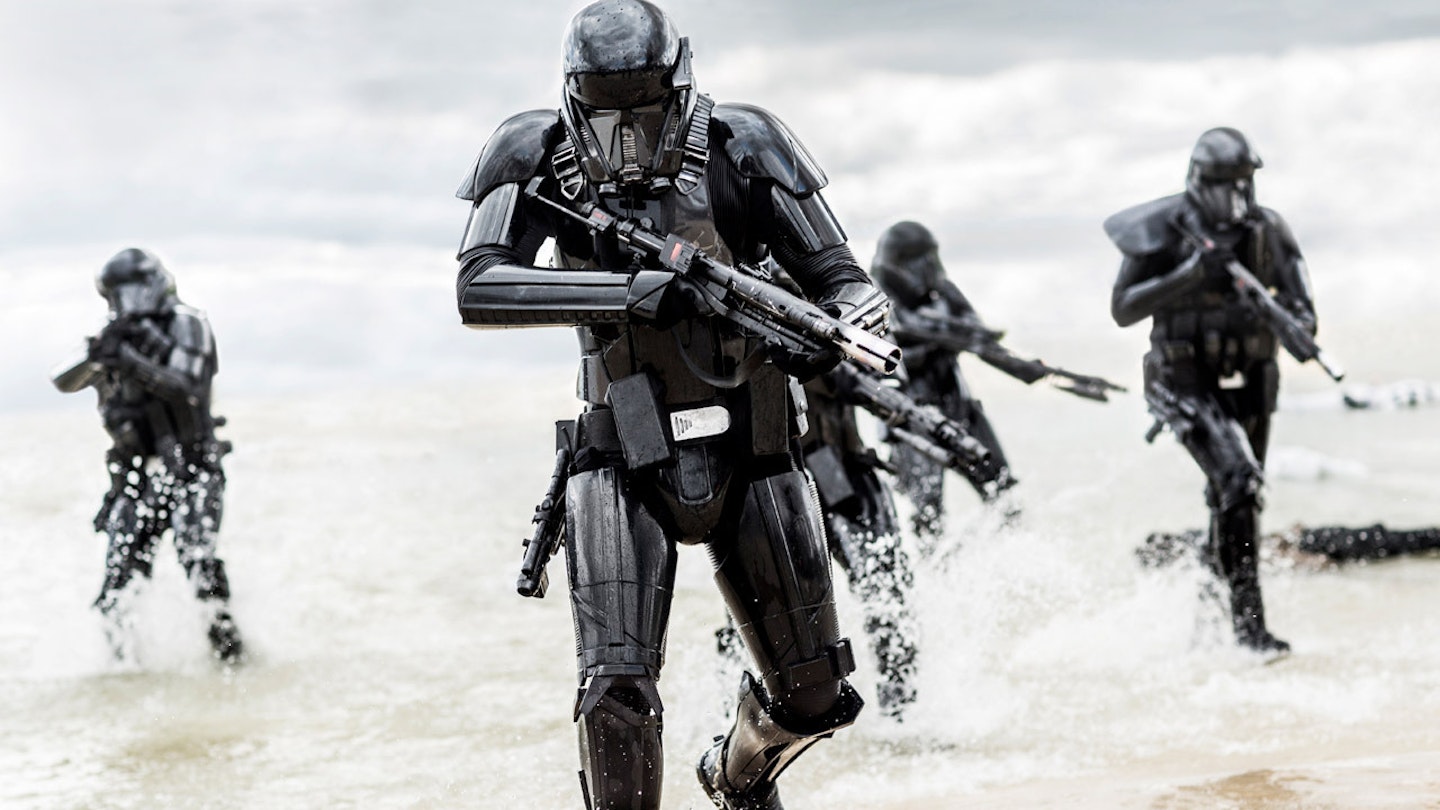
Mikkelsen: In many ways Gareth felt like a kitchen-sink drama type of guy. There was a small-budget intimacy in what he was doing. It did absolutely feel like somebody I recognised in my small-budget Danish films. I feel we are in a more gritty part of the Star Wars universe. You have the pipes running and stuff, but they might not be as clean as in some of the previous films. And it also maybe brings it back to scratch a little, where there’s minimal CGI. I mean, we used it, but only when it’s required.
Ahmed: They built so much for real. My first day on set just blew my mind. They really created a whole world, everything from palm trees to spaceships. They really do create the world for you. And that's amazing as an actor to just be able to step into that. If you pick up a random prop on set and turn it around, it's got the Star Wars alphabet stuff written on it, different buttons and a touch-screen thingumajig… And it's never gonna be in shot!
Tudyk: There was a day where we were landing a spaceship. A U-wing. And I've landed spaceships before. I've been a pilot before, I know what it's like to land a spaceship. But this was different. The way that Star Wars lands a spaceship is you get into a big, shipping-container-sized box, inside of which is the set. And there's windows that look out and when you're inside it looks like a spaceship. Then they hook it up to a crane. And they lift it three, four storeys in the air. And then they land you where you're gonna land. [laughs] And I was the only one that was like, “Are we sure that this is all... Did we check the cables? Everybody's cool with the cables?” And I mentioned, “You know there's an easier way to this,” but it was nowhere near as fun to just do it digitally. They were grabbing as many practical effects as they possibly could in any given moment. They didn't leave a lot to digital effects. Er... That being said by someone who is entirely CGI!
Jones: It is a unique experience, because you’ll be with Riz or Diego, and you'll be discussing a scene and you'll be very politely and seriously talking about how we're gonna do this… And then suddenly you'll look up and there's, like, a giant monkey hanging out of an airship who's practicing shooting. So it's quite extraordinary. It is a magical experience and one where you're constantly storing those moments and remembering them. I think when I'm a little old lady and I'm hopefully 95, I'll look back on those very fondly.
